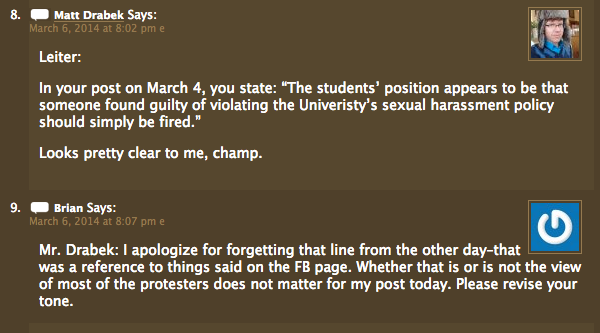“What I am not going to do is capitulate to a cyber mob that is exercised about issues that are irrelevant.” – Brian Leiter [my emphasis]
Brian Leiter has a tendency to describe his critics in the language of irrationality. He suggests that this current fracas is a ‘smear campaign’ put together by a ‘cyber mob’, for example. Mobs don’t think very carefully or very critically. Mobs have worked themselves up into a frenzy of groupthink and are not easily influenced by reason. (Though in this instance, the ‘mob’ of people signing on to a boycott of a Leiter-run PGR includes, inter alia, Elizabeth Anderson, Crispin Wright, Van McGee, Charles Mills, Ruth Chang, Bill Brewer, Beatrice Longuenesse and Gil Harman. That’s a fairly philosophically diverse – and a damn philosophically impressive – mob, as mobs go.)
Leiter often paints his own conduct as rational discourse beset on all sides by mob mentality and ‘tone policing’. (What’s a tough-talking New Yorker to do in these woefully PC times?) It must be difficult when so many of the people you have to work with are so irrational:

But, of course, it isn’t that simple.
To begin with, it’s not that Leiter has a problem with internet campaigns – even those run by philosophers! – in general. He didn’t seem to think there was any mob mentality in the recent proposed boycott of the University of Illinois, nor did he attribute the petitions and boycotts related to the Synthese special issue to this kind of irrational groupthink, nor did he think it was a cyber mob mentality that warranted a poll to gauge whether Linda Alcoff should resign as president of the Eastern APA. So it can’t be that he simply thinks internet-based campaigns are, as a rule, a bad idea. Nor can it be that he always thinks any kind of corrective comment about ‘tone’ is inappropriate:


Perhaps, in this instance, it is the nature of the perceived insults in question. Leiter has suggested that philosophers are overreacting to the messages he sent to Carrie Jenkins and Noelle McAfee. These emails were, if perhaps intemperate, prompted by attacks from these individuals that could not be ignored. Jenkins, Leiter claims, said on her blog that he was ‘unprofessional’, which he says in his email to her may count as defamation per se; McAfee said on her blog that he was not a philosopher. Let’s leave aside the issue of what Jenkins said, and consider the cases as Leiter presents them. One thing that’s striking here is that Leiter himself calls people unprofessional. And he also seems to insinuate that other academics with PhDs in Philosophy are not in fact philosophers. Given that, it doesn’t seem plausible that Leiter can perceive the insults (he thinks were) leveled at him to be so beyond the pale that the philosophical community is simply being irrational in its unwillingness to see that his response is merited.
So what’s going on? Why is it that this particular group of people boycotting the PGR – a group which is striking in its philosophical diversity – constitute a ‘cyber mob’ engaged in a ‘smear campaign’? I don’t know. I don’t know the reasons for Leiter’s attributions of mob mentality, and I don’t want to speculate. I’ll just register it’s very unclear to me why this particular boycott – which is very elegantly and not particularly mobbishly defended in this post at Daily Nous – is apparently so infused with irrationality.


